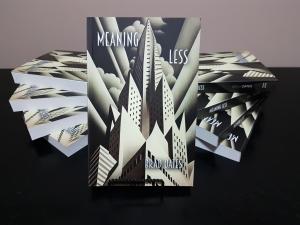Under the Green Desk Lamp…
 Bushido: (武士道) literally meaning “the way of the warrior”, is a Japanese word for the way of the samurai life, loosely analogous to the concept of chivalry in Europe. (Source)
Bushido: (武士道) literally meaning “the way of the warrior”, is a Japanese word for the way of the samurai life, loosely analogous to the concept of chivalry in Europe. (Source)
Bogney: A tiny dog, wise for his years.
 Today, we once again combine the old and the new for a fresh perspective on life through the eyes of our classy canine friend. This is the daily living of a small dog. This is the extrapolated wisdom of the ages…This is the Bushido of Bogney.
Today, we once again combine the old and the new for a fresh perspective on life through the eyes of our classy canine friend. This is the daily living of a small dog. This is the extrapolated wisdom of the ages…This is the Bushido of Bogney.
Lesson 1:
One quiet winter night, Bogney was sleeping peacefully on the carpet by the door when he was taken by a sudden fit of shakes. Terribly concerned, I took him to the emergency vet. Waiting with terrible trepidation, I thought of the countless memories we had spent over the 15 years we’d known each other. I could not control my tears.
I hoped for the best, but the best did not come. When returned to me, Bogney kissed me happily and wagged his tail with unrestrained joy, heeding no words even as his Doctor described to me the tumour growing in his brain, and the pittance of time he had left. Still in my arms he wiggled and squirmed, eager to leave this boring place.
The years left had become weeks, or months if we were lucky. I thought again of the many moments behind us, and the sparse few we might have left. Somehow, they seemed all the more valuable.
At Bogney’s insistence, we went to the park. True wisdom is often found not in fearing the future, but in living the present.
Lesson 2:
Bogney struggles to move at times these days. He is old and stiff, sometimes disoriented. Rolling over is a struggle now, but when the treats come out, he is instead all the more eager to shake a paw. Undeterred, he finds a way to get what he needs.
We could all learn something from this tenacity.
Lesson 3:
Good days come, and good days pass. Without warning one night, Bogney was taken again by seizures, and was forced to spend a day and a night at the vet. When I was finally allowed to visit him, I found him confused, and his senses dulled. He could not see what was before him, and set his shaking chin in my hands.
Finally, he fell asleep, and his snore was a song of relief. For this moment, he is content.
This is my place. But it is not yet his time.
Lesson 4:
In these days of decline, Bogney and I sleep together on a mattress set on the living room floor. We cannot risk a jump up to any higher bed.
One evening, lying on the mattress, I heard his feet creeping towards me. With his tail wagging and a grin on his face, he happily approached for a kiss, when suddenly his expression changed, and his lips curled in a strange way. His tumour sprang to my mind, and a wave of fear overtook me. Then, Bogney’s mouth gaped open, and he belched loudly in my face. It was long and loud. Both of us stood shocked for a moment, then I laughed, and he resumed with his kisses.
There is great value in a moment such as this.
Lesson 5:
Many months have passed, and the dreaded time has come. Bogney left this world with grace and courage. He kissed me goodbye, then fell asleep in my arms.
For 15 years we walked beside each other. Now our paths are sundered, and I am alone. Alone with everything he gave me.
All these ancient alarms are still going off in my head. Walks to take, food to give, meds to provide. Now to no purpose. Klaxon reminders of a battle with no winning. I am undone, and bereft of battlefields.
The way of the warrior is beyond us now. There is only peace for him now, and in time, myself as well. With his final battle behind him, the wise old dog has taught me who I always was. His final lesson.
I always will remember.
I love you Bogney.
-Brad OH Inc.









